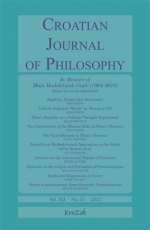Aristotle on the Intentional Nature of Emotions
Aristotle on the Intentional Nature of Emotions
Author(s): Péter LautnerSubject(s): Philosophy
Published by: KruZak
Keywords: intentionality; body; physical process; hylemorphism; rhetoric; hatred
Summary/Abstract: Emotions are characteristic activities/states in hylemorphic structure of the Aristotelian soul. Emotional activities/states are physiological processes/states as well, as it is particularly clear in anger. It raises the question about the origin of their intentionality. Sometimes sheer bodily processes can lead to emotions, which implies that intentionality in emotions might also originate in bodily processes. But Aristotle does not generalize this point in saying that all emotions are due to bodily processes. Moreover, since they are complex phenomena, involving opinion, representation, desire, pleasure and pain, their intentional nature must also be a certain amalgamate of the intentionality of the ingredients. It involves that the relevant kinds of pleasure and pain are also intentional states. On the other hand, besides establishing certain general similarities Aristotle does not seem to have worked out a unifi ed theory of emotions. To mention but one well-known example, most of the emotions he discusses in detail are based on representation, whereas hatred is supported by a general statement.
Journal: Croatian Journal of Philosophy
- Issue Year: XII/2012
- Issue No: 35
- Page Range: 221-237
- Page Count: 17
- Language: English
- Content File-PDF

